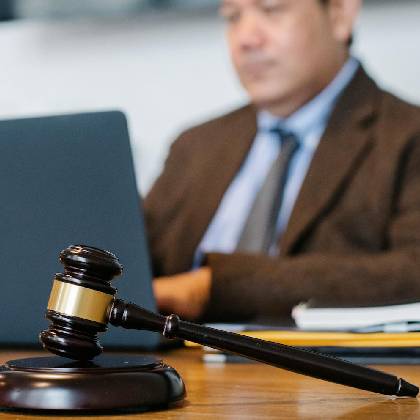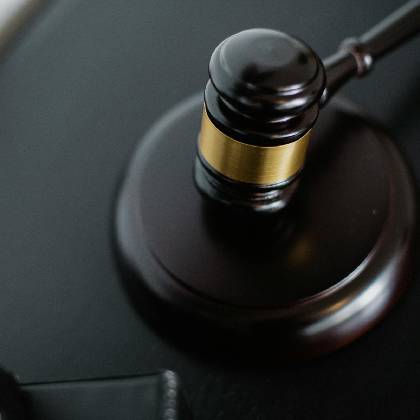Written By: Matthew Phillips | Last Updated: May 17 2021 | Category: Bail
How To Get Unpaid Invoices Settled (5 Easy Steps)

Getting customers to pay their overdue invoices can be a challenging task, but there are several steps you can take to improve your chances of getting paid:
Step 1 - Send reminders to customers reminding them of the consequences of non-payment
Personalized Email Reminders: Sending a personalized email reminder to the client can be an effective way to prompt them to pay their invoice. Include the client's name, the invoice amount, and the due date in the email. It's also helpful to include a polite reminder of the payment terms and any late payment fees that may apply. Be sure to thank the client for their business and provide contact information for any questions or concerns.
SMS Text Message Reminders: A quick and easy way to send an invoice reminder is through SMS text messaging. This is a great option for clients who are always on the go and may not have access to their email. Be sure to keep the message short and concise, and include a link to the invoice for easy payment.
Phone Call Reminders: For overdue invoices or clients who are consistently late in paying, a phone call reminder can be effective. This shows that you take the matter seriously and are following up on the payment. Be sure to remain professional and polite during the call, and offer to answer any questions or concerns the client may have.
Step 2 - Offer incentives like discounts, rewards, or penalty fees
Early Payment Discount: Offering an early payment discount is a great way to encourage customers to settle their invoices quickly. For example, you could offer a 2% discount if the customer pays within 10 days instead of the usual 30-day payment term. This gives customers a financial incentive to pay early, which can help improve your cash flow and reduce the risk of late payments.
Late Payment Penalties: Another way to incentivize customers to settle their invoices is to impose a late payment penalty. This penalty could be a fixed percentage of the invoice amount or a flat fee. By charging customers for late payments, you can encourage them to pay on time, which can help you avoid cash flow problems and reduce the risk of bad debt.
Invoice Financing: Offering invoice financing can also incentivize customers to settle their invoices quickly. This involves selling your invoices to a third-party company for a fee. The third-party company then pays you a percentage of the invoice value upfront, which can help you improve your cash flow. Customers may be incentivized to pay quickly if they know that the invoice has already been sold to a third-party company and that any delays in payment may result in additional fees or penalties.

Many businesses quickly go to penalties to try force customers to pay. There is a shift in A/R to try use incentives to help with unpaid invoices. Offering settlement discounts on unpaid invoices may just get customers paying. Also consider the cost should you have to hand over to 3rd party collectors. These can range between 30-40% of the debt while a small 10% incentive to pay is a signifcant saving.
Step 3 - Communicate the importance of timely payments and the impact on your business
Personalized Communication: One effective way to improve communication with debtors is to personalize communication. Rather than sending out generic form letters or emails, consider tailoring your messages to the debtor’s specific circumstances. This can help build trust and rapport, and make it more likely that the debtor will be receptive to your requests for payment. You can use their name in your communication and acknowledge their specific financial situation, such as their payment history or the amount they owe.
Multiple Channels: Not all debtors will respond to the same communication channel. Some may prefer phone calls, while others may prefer email or text messages. To improve communication, try to offer multiple channels for debtors to reach you. This allows debtors to choose the method that is most comfortable for them, increasing the likelihood of successful communication.
Clear and Concise Communication: It's important to ensure that communication with debtors is clear and concise. Debtors may feel overwhelmed or confused by complex legal jargon or technical language. Be clear in your communication and avoid using language that may be difficult for the debtor to understand. Use simple language and provide clear instructions on how the debtor can make payments or get in touch with you if they have questions or concerns. Also, be sure to provide clear and accurate information on the debt, including the amount owed and the due date.
Step 4 - Escalate the Issue
Hire a collection agency: One option for escalating unpaid invoices is to hire a collection agency. Collection agencies specialize in recovering debts and can take a range of actions to try to get your customers to pay their overdue invoices. Collection agencies typically charge a fee, which is a percentage of the amount they are able to collect.
Use a lawyer: Another option is to hire a lawyer to help you collect the unpaid invoice. A lawyer can send demand letters, file a lawsuit, or take other legal actions to try to get the customer to pay. While this option may be more expensive than hiring a collection agency, it may be more effective in some cases.
Sell the debt to a debt buyer: If you are unable to collect the unpaid invoice using other methods, you may want to consider selling the debt to a debt buyer. Debt buyers purchase delinquent debts at a discount and then try to collect the full amount from the debtor. While you may not receive the full amount of the unpaid invoice if you sell the debt, it can help you recover at least some of the money owed to you.
Step 5 - Improve your systems
Use data analytics and AI: Debt collection systems can benefit from advanced data analytics and AI technologies to identify patterns and trends in the behavior of delinquent debtors. This information can be used to optimize collection strategies and improve the success rate of debt recovery efforts. By leveraging AI tools, debt collectors can predict which accounts are more likely to default, what collection methods work best for each debtor, and when is the best time to contact them.
Implement digital collection channels: With the rise of digital technology, it's becoming increasingly important for debt collection systems to offer a range of digital channels, such as email, SMS, chatbots, and social media, to reach out to debtors. These channels can be more cost-effective and convenient than traditional methods, and they can help improve communication and engagement with debtors, ultimately increasing the likelihood of repayment.
Provide flexible repayment options: Debtors are more likely to make payments if they feel they have control over the process. By providing flexible repayment options, such as installment plans, deferred payments, or reduced settlements, debt collectors can give debtors the ability to choose the repayment method that works best for them. This approach can help reduce the stress associated with debt collection and increase the chances of successful debt recovery.
Quick Tip and concluding Thought:

Collecting unpaid invoices can feel mundane and monotonous but the impact of not setting up a methodical and repetitive process on your cash flow can be disaster for your business. If you're a small or medium size business you're likely more focused on revenue and keeping customers happy so I recommend using software/tech to augment your admin team and handle the tasks associated with following up. Yes, I’d recommend our Carol software but it really has been built to help businesses automate the process and chase up unpaid invoices.
Remember to always maintain a professional and courteous tone when communicating with your customers about overdue payments, as maintaining a good relationship with them is important for future business.




